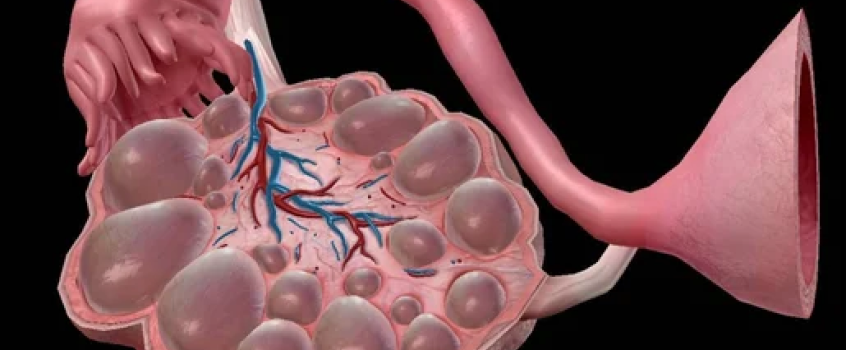PCOS

Polycystic ovary syndrome (PCOS) is a common hormonal disorder in women that causes irregular periods, excess hair growth, and ovarian cysts.
What is it?
Polycystic Ovary Syndrome (PCOS) is a common hormonal disorder that affects women of reproductive age. In PCOS, the ovaries produce an abnormal amount of androgens (male hormones) and may develop many small cysts, which are immature follicles that failed to release eggs. This results in irregularities in the menstrual cycle and a disruption in the normal functioning of the ovaries.
PCOS is characterized by hormonal imbalances, where the production of male hormones (androgens) is higher than normal, and the ovaries produce a higher quantity of unmatured eggs. It can lead to irregular or missed periods, ovulation problems, and even infertility. Women with PCOS may also experience weight gain, acne, excessive hair growth (hirsutism), and scalp thinning. While PCOS does not directly affect a woman’s ability to conceive, it can cause ovulation problems, which may make it more difficult to get pregnant.
PCOS is also closely associated with other health conditions such as insulin resistance, diabetes, and an increased risk of cardiovascular disease. The exact cause of PCOS remains unknown, but it is believed to be influenced by genetics, insulin resistance, and inflammation.
Signs and Symptoms
The signs and symptoms of PCOS can vary widely, but the most common symptoms include:
Irregular Menstrual Cycles:
Women with PCOS may have infrequent, prolonged, or absent periods.Anovulation (Lack of Ovulation):
This can lead to difficulty in conceiving and may cause irregular periods.Excessive Hair Growth (Hirsutism):
Elevated androgen levels can cause excessive hair growth on the face, chest, abdomen, or back.Acne and Oily Skin:
Hormonal imbalances often lead to acne breakouts, particularly on the face, back, and chest.Scalp Hair Thinning:
Women with PCOS may experience thinning or hair loss from the scalp, which is often male-pattern baldness.Weight Gain:
Many women with PCOS struggle with weight gain, especially around the abdomen.Ovarian Cysts:
Ultrasound scans often reveal enlarged ovaries with multiple cysts, though not all women with PCOS will have visible cysts.
Causes
Although the exact cause of PCOS is unknown, several factors are believed to play a role in its development:
Genetics:
PCOS tends to run in families, which suggests that genetics may play a significant role in its development. If a close family member (mother or sister) has PCOS, your risk may increase.Insulin Resistance:
Women with PCOS often have insulin resistance, meaning their body’s cells do not respond to insulin properly. As a result, the body produces more insulin, which can lead to higher androgen levels and exacerbate PCOS symptoms.Hormonal Imbalance:
PCOS is linked to an overproduction of androgens (male hormones), which disrupts normal ovulation and causes symptoms like acne, hirsutism, and irregular periods.Inflammation:
Women with PCOS may have low-grade inflammation that stimulates the ovaries to produce more androgens. This inflammation can further contribute to the development of symptoms.Environmental Factors:
Lifestyle factors such as poor diet, stress, and exposure to endocrine-disrupting chemicals may contribute to the onset of PCOS or worsen its symptoms.
Why One Should Not Take Patent Homeopathic Medicine
Although patent homeopathic medicines may seem convenient, they typically offer one-size-fits-all solutions and do not take into account the specific needs of the individual. Patent homeopathic remedies are generally formulated for common symptoms rather than the root cause of complex conditions like PCOS.
Taking unregulated or non-tailored homeopathic remedies could lead to a delay in proper treatment, or worse, worsen symptoms due to lack of individualization. These treatments often fail to address underlying hormonal imbalances, insulin resistance, or emotional factors contributing to PCOS. Since PCOS is a multifaceted condition, relying on patent medicines may result in ineffective management and prolonged symptoms, making it difficult for women to achieve balance and overall health.
It is important to consult with a qualified homeopathic practitioner who will create a personalized treatment plan based on your unique health profile. This individualized care ensures that the underlying causes of PCOS—like hormonal imbalances and insulin resistance—are addressed appropriately and effectively.
Benefits of Homeopathy in Treating PCOS
Homeopathic treatment for PCOS offers a holistic approach, targeting both the physical and emotional aspects of the condition. It aims to restore balance to the body’s hormonal system, regulate menstrual cycles, and address symptoms naturally. Homeopathy offers several benefits, including:
Hormonal Regulation:
Homeopathy can help normalize hormonal levels, improving ovulation and regularizing menstrual cycles.Reduced Androgen Levels:
By addressing the root cause of the hormonal imbalance, homeopathy can reduce symptoms like hirsutism, acne, and hair thinning.Improved Insulin Sensitivity:
Homeopathic remedies can support the body in improving insulin sensitivity, helping manage metabolic functions and reducing the risk of type 2 diabetes.Weight Management:
Homeopathy can help regulate metabolism and promote healthier weight management, especially in women struggling with abdominal fat.Emotional Balance:
PCOS can cause emotional distress due to physical symptoms. Homeopathy addresses mental and emotional well-being, reducing stress and anxiety that may worsen symptoms.
TheHomeoSaga specializes in providing personalized homeopathic consultations to women suffering from PCOS. Our expert practitioners focus on individual symptoms, working towards holistic healing and long-term relief from PCOS without relying on temporary solutions. Through personalized care, you can restore balance to your body and manage PCOS effectively with natural remedies.
